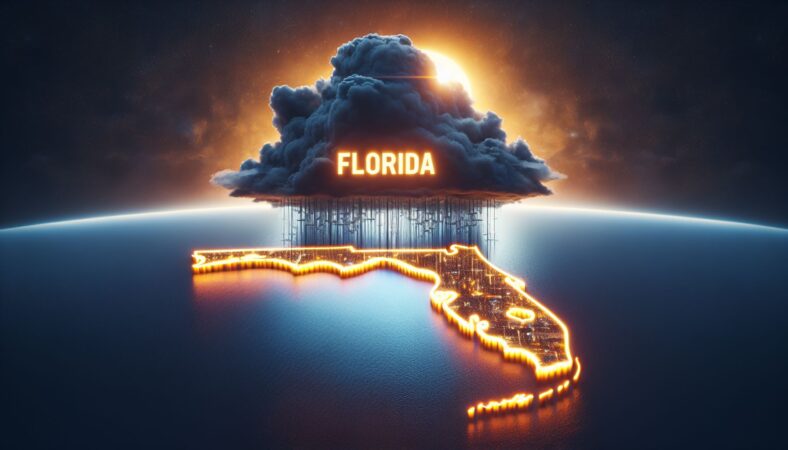In recent years, the discussions around free speech and censorship have reached a fever pitch across the United States. As a seasoned blogger and independent journalist, having traipsed across the vast expanse of the Sunshine State, I’ve witnessed the cultural and political unravelings first-hand. Florida news is often a microcosm of greater American debates, and the latest on the conservative radar here is Florida’s rousing stand against Big Tech censorship—a battle that casts long shadows across our swaying palms and sunlit coasts.
The ethos of Florida has always been one of defiance and self-determination. From the Panhandle to the Keys, Floridians share a pioneering spirit that reverberates through the everglades and up the steel spines of our cities. Historically, Florida has been a place where voices weren’t just heard but amplified—a tradition that’s now becoming legislated.
Governor Ron DeSantis’s recent pushback against the silicon overreach showcases this perfectly. The Florida legislature has been hard at work crafting laws designed to protect its citizens from the unchecked power of Big Tech companies—an endeavor that’s stirred both applause and controversy in the heart of the peninsula.
The conservative perspective on this is clear: freedom of speech is sacrosanct, and the notion that tech conglomerates can unilaterally decide what is and isn’t acceptable speech goes against the very grain of American ideals. My travels throughout Florida have shown me that this isn’t just a whim of the leadership, but a concern that resonates deeply with everyday Floridians.
In bustling coffee shops in Tampa Bay, retired veterans in Naples, and fishing communities along the Gulf Coast, I’ve listened to folks express fear over the erosion of their ability to speak freely online. They’ve seen the headlines where opinions—particularly those leaning conservative—are silenced under ambiguous banners of ‘hate speech’ or ‘misinformation.’ They’ve wondered aloud whether their digital town squares have, indeed, become too small for true democracy.
One could argue, with profound simplicity, these Floridians aren’t asking for much. They’re asking for the same freedoms promised to them under the Constitution to be upheld in digital spaces. They maintain that the spirit of the First Amendment should hold sway over algorithms and corporate policies not written with the pen of justice but driven by market trends and partisan pressures.
The dramatic showdown has drawn eyes from all over the nation, with enthusiasts and critics dissecting every angle. Detractors of Florida’s legislation paint it as an infringement on the companies’ rights to moderate content on their platforms. They say that it’s a slippery legislative slope that could lead to a Wild West of internet speech, where falsehoods and harmful content run rampant without check or balance.
However, to the conservative observer, such an argument is a smoke screen that clouds the underlying principle at stake: that to allow corporations the unchecked power to silence is as dangerous as the falsehoods they purport to combat.
Throughout my travels—in the shadow of the launch pads at Cape Canaveral, under the antique fans of Hemingway’s Key West home, and on the sugar-sand beaches of the Emerald Coast—I’ve seen an unwavering commitment among Floridians to uphold the tenets of freedom and liberty. They describe a Florida where the sun should shine on all, where ideas can compete on their merit under the clear blue skies—not under the opaque ceiling of corporate censorship.
To these Floridians, it’s not a mere provincial squabble. Florida’s stand against Big Tech is symbolic of the larger American experience—a defiant gesture that waves, like a flag, over the Union. It’s a testament to the resolve to tackle twenty-first-century problems with a constitutional compass—where guidance is drawn not from the transient tweets and trends but from the enduring promises etched in our founding documents.
As I pen these observations, Florida news becomes more than local fodder; it ascends to a national stage. The repercussions of this fight will echo beyond our alligator-filled marshes and dance on the national discourse. This tale from the Sunshine State is a glimpse into how America grapples with the complexities of modern freedoms.
The evening air is charged with the scent of orange blossoms and the anticipation of what’s to come. As the sun sets on another visceral Florida day, the implications of this legal challenge settle. Is it possible to preserve a free and open internet while protecting the individual from the tyranny of silicon empires? Florida’s bold move will either pave a path of balance or serve as a stark warning to others who might follow.
In the end, this is more than just Florida news—this is the story of an America unafraid to wade into the marshes of the unknown, emboldened by the belief that principles must guide our foray into the digital future. And as the sun drops beneath the horizon, casting a soft glow on the ever-dynamic face of this paradise, I’m reminded that here, in Florida, the battle for the soul of the internet isn’t just being fought—it’s being led.
